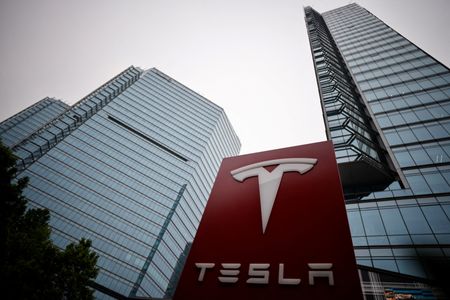By Qiaoyi Li and Brenda Goh
BEIJING/SHANGHAI (Reuters) -U.S. automaker Tesla and its chief Chinese rival BYD achieved record deliveries of their China-made vehicles in the second-quarter, China Passenger Car Association (CPCA) data showed, as a fight for market share heats up.
Tesla sold 93,680 China-made electric vehicles (EVs) in June, up 18.72% from a year earlier, when Tesla’s factory in Shanghai delivered 78,906 China-made Model 3 and Model Y vehicles after the city ended a two-month COVID-19 lockdown.
The U.S. automaker sold 247,217 China-made cars over April-June, the most since it started delivering vehicles from Shanghai in early 2020, the data also showed. Tesla reported record deliveries of 466,140 globally for the second quarter.
Chinese rival BYD, with its Dynasty and Ocean series of EVs and petrol-electric hybrid vehicles, saw June sales surge 88.16% year-on-year to 251,685 vehicles, according to CPCA data.
This was also the first time BYD’s monthly sales surpassed 250,000 units and meant that between April to June, BYD delivered 700,244 vehicles, the data showed.
CPCA estimated total sales of new energy passenger vehicles – both at home and for export, and including pure electric and plug-in hybrids – at 740,000 units in June, up 30% from a year earlier. It did not separate domestic sales and exports.
The companies’ sales surge point to how they are so far managing to stay ahead of their competition even as overall auto sales slow in China amid a softening economy.
Tesla slashed prices for its two ageing models at the beginning of the year to boost sales and started a price war, prompting competitors – including BYD – to offer discounts or new lower-priced models.
The EV sector is also being given additional support from the Chinese government, which wants to drive sales to shore up a faltering economic recovery.
In June, Beijing announced 520 billion yuan ($71.67 billion) worth of purchase tax breaks on new-energy vehicles through the end of 2027. Caps on the tax exemption, however, may help drive sales growth of cheaper models that are mainly produced by domestic firms rather than premium vehicles from foreign makers, analysts said.
($1 = 7.2553 Chinese yuan)
(Reporting by Qiaoyi Li, Zhang Yan and Brenda Goh; Editing by Christopher Cushing, Himani Sarkar and Conor Humphries)
